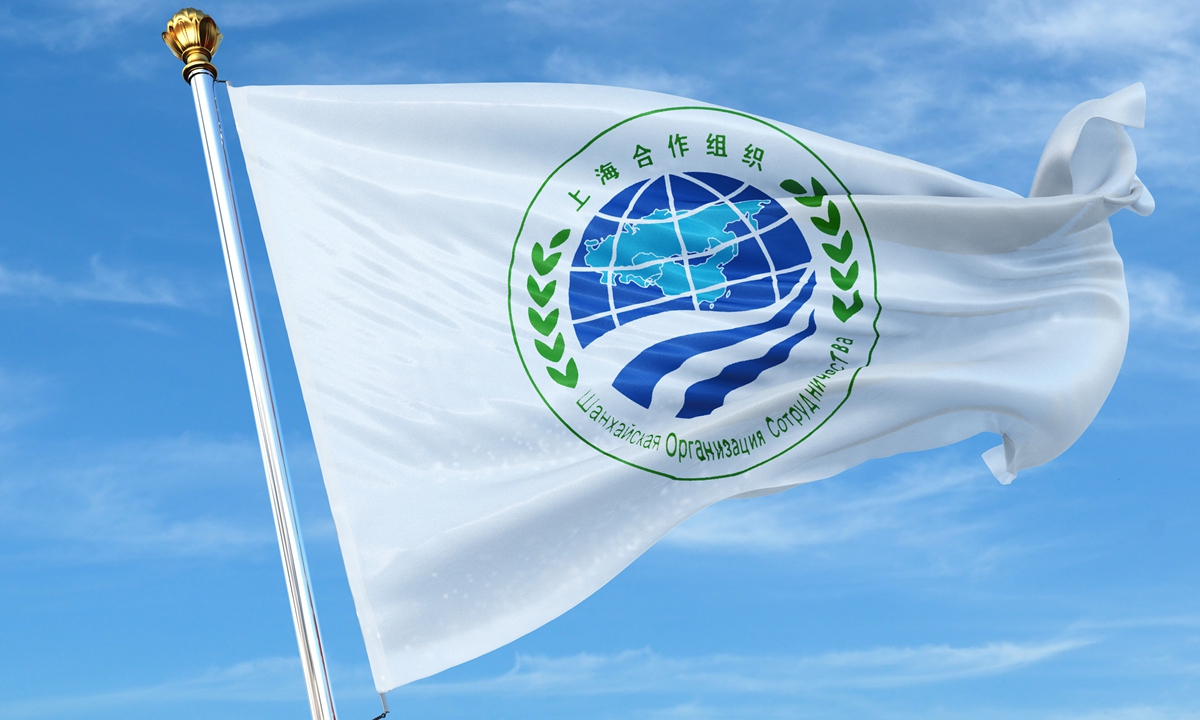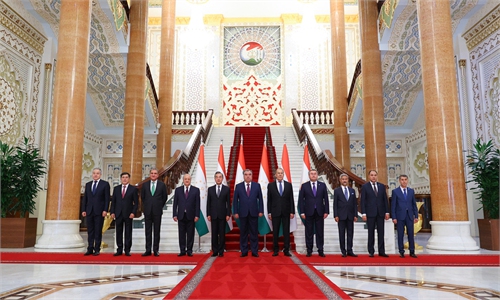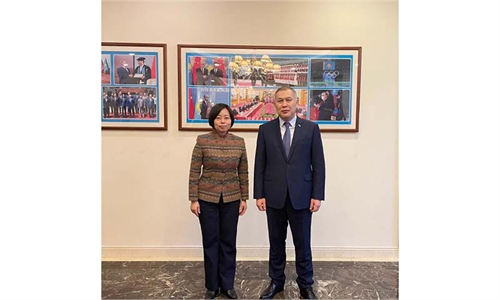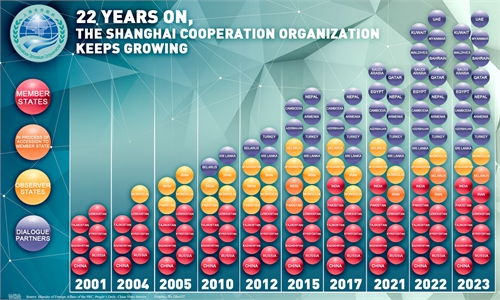Premier Li kicks off trip to Kyrgyzstan, attend SCO meeting
Visit vital to implementing summit outcomes; SCO more capable in boosting regional connectivity, stability

Shanghai Cooperation Organization Photo: VCG
Chinese Premier Li Qiang on Tuesday starts his four-day trip to Kyrgyzstan, attending the 22nd Meeting of the Council of Heads of Government of the Shanghai Cooperation Organization (SCO) Member States in Bishkek, and paying an official visit to Kyrgyz Republic from October 24 to 27, at the invitation of Prime Minister Akylbek Japarov of the Kyrgyz Republic.It's Li's first visit to Kyrgyzstan since taking office earlier this year, and also the second visit to the country by a Chinese premier in seven years, which Chinese experts viewed as a crucial occasion in promoting the implementation of outcomes reached by leaders in China-Central Asia Summit, further expanding bilateral trade, as well as accelerating regional connectivity projects represented by the China-Kyrgyzstan-Uzbekistan railway.
Besides, from the possible topics to be discussed, experts said it's not difficult to find that the SCO, of which Central Asian countries are the main members, no longer only emphasizes the traditional security affairs, but it's also developing in a comprehensive way by involving economic and trade, connectivity and people-to-people exchanges, so as to make the region more closely linked, promoting stability and prosperity. Against the rising conflicts and tensions in other parts of the world, the SCO has innovated a path of regional security cooperation and integrated development, providing a reference for other regions, the experts said.
Promoting tangible progress
According to a readout sent to the Global Times from the Embassy of Kyrgyzstan to China, Premier Li will meet with Japarov, and the parties will discuss issues of political, trade and economic, cultural and humanitarian cooperation, as well as in other areas of cooperation. During the visit, a number of bilateral documents in various areas of cooperation will be signed.
In a recent press briefing, Chinese Foreign Ministry spokesperson Mao Ning said that Li's visit will "further deepen the high-level political mutual trust between our two countries, boost all-round cooperation, and promote substantive and tangible progress in our comprehensive strategic partnership for a new era."
Zhu Yongbiao, an expert in Central Asia studies in Lanzhou University, told the Global Times on Tuesday that the meeting between Li Qiang and Kyrgyzstan leaders will aim at promoting the implementation of the agreements reached between the two heads of state during the China-Central Asia Summit.
During a meeting of the heads of state on the sidelines of the China-Central Asia Summit in Xi'an in May, China and Kyrgyzstan announced the elevation of the bilateral ties to a comprehensive strategic partnership for a new era. The two sides signed multiple bilateral cooperation documents in such fields as economy and trade, industries and investment, customs, agriculture, and cultural and people-to-people exchanges.
Another important aspect is likely about regional connectivity, according to Zhu, "the two sides will discuss accelerating the construction of China-Kyrgyzstan-Uzbekistan railway, and even also the planning railway connecting Uzbekistan, Afghanistan and Pakistan."
The construction of the cross-border railway network will further diversify the connectivity between China and Central Asia, and safety, reliability, and stability of the connection will be dramatically improved as well, Zhu said.
The two sides are also expected to discuss further expansion of bilateral trade, Zhu said. He noted that Kyrgyzstan's agricultural and primary processed products have grown considerably in trade with China over the past few years, and there's potential for further growth.
China is Kyrgyzstan's top trading partner. Official data shows that in 2022 China-Kyrgyzstan trade amounted to $15.5 billion, an increase of 105.6 percent year-on-year. Two-way trade between China and Kyrgyzstan in the first eight months in 2023 has reached $12 billion, with a year-on-year surge of 27.9 percent, according to media reports.
Positive force
The trip to Bishkek also covers Premier Li Qiang's first attendance to the Meeting of the Council of Heads of Government of SCO Member States.
Established in 2001, the SCO consists of nine members that cover more than 40 percent of the world's population: Kazakhstan, China, Kyrgyzstan, Russia, Tajikistan, Uzbekistan, India, Pakistan and Iran.
Analysts said that for China, Central Asia is a key strategic corridor, whether it is the Belt and Road Initiative, the China-Europe railway express, as well as China's participation in the construction of the Trans-Caspian International transport route. Central Asia is also an important source of oil and gas resources and has a special position in ensuring China's energy security.
The multilateral security-focused forum has enhanced solidarity and mutual trust among member states, and played an important role in safeguarding the security and stability on the Eurasian continent. Now, the SCO is covering more.
According to Chinese Foreign Ministry, Premier Li together with other participating leaders will follow through on the consensus reached at the summit in July, have in-depth exchange of views on the SCO Development Strategy and formulate concrete measures on cooperation in such areas as security, economy and trade, connectivity and people-to-people exchanges.
Although the SCO meeting will still emphasize the strengthening of regional security cooperation, which is the initial function of the SCO, it is not difficult to find that the SCO is becoming more comprehensive and multi-dimensional, as it's no longer confined to the traditional security areas, Li Haidong, a professor at the China Foreign Affairs University, told the Global Times on Tuesday.
Through its public goods in the areas of trade, economic and cultural exchanges, the SCO is becoming more capable in bringing about closer connectivity among all parties, thereby realizing lasting peace, prosperity and stability in the region in a manner different from that of the past, Li noted.
"This is also a positive force for world stability and development in an increasingly complex and strained geopolitical landscape," the expert added.
Under the principles of "mutual trust, mutual benefit, equal rights, consultations, respect for the diversity of cultures and aspiration towards common development," the SCO has created a new path of regional security cooperation and integrated development, which also serves as a reference for other regions of the world, Zhu said.






